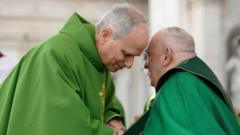Cardinal Robert Prevost's election as pope signals hope for continuity and unity, addressing the urgent needs of the Church and its followers during turbulent times.
Pope Robert Prevost Elected: A Beacon of Continuity and Unity in the Catholic Church

Pope Robert Prevost Elected: A Beacon of Continuity and Unity in the Catholic Church
Pope Francis’ Legacy Continues with New Leadership Amid Global Challenges
In an unexpected speed, the conclave that elected Cardinal Robert Prevost as the new pope wraps up, hinting at a shared consensus among the voting cardinals regarding his capability to navigate the multifaceted challenges the papacy presents. As discussions ensued—both in formal settings and informal gatherings—two prominent themes echoed among the cardinals: "continuity" and "unity." Many recognized Pope Francis' significant strides in outreach, focusing on marginalized groups and engaging with those beyond the traditional confines of the Catholic Church.
Following the tenure of Pope Francis, who has made notable impacts by amplifying the voices of the oppressed, there is now a focused realization that efforts must be made to bridge the often contentious divide between diverse ideological factions within the Church. This divide has conventionally been framed as traditionalist versus progressive. Prevost emerged as a viable candidate since he has historically supported Pope Francis' initiatives while also maintaining an image that resonates across the Church's various branches.
The cardinals were charged with not only considering the future of the Church but also the broader human condition, especially given the global backdrop of conflict and division. Cardinal Prevost, a dual citizen of the U.S. and Peru, is seen as someone capable of connecting disparate communities, thereby embodying the bridging role envisioned by the cardinals.
Amid criticisms that Pope Francis faced, particularly concerning communication strategies on contemporary issues like migration and climate change, Prevost's elevation suggests a renewed hope for effective dialogue. In his inaugural address from St. Peter's balcony, he invoked the necessity of "building bridges" and fostering a sense of global unity—echoing key themes of Pope Francis’ papacy.
As Prevost begins this monumental journey, he anticipates scrutiny regarding his past, his political beliefs, and his historical handling of sensitive issues like abuse within the Church. While some details are publicly known, the conclave presumably felt confident that no obstacles significant enough existed to hinder his leadership vision.
With just four votes to conclude the conclave, Prevost starts his papacy with strong support from the voting cardinals, marking a hopeful beginning amidst the daunting challenges ahead for the Catholic Church.



















